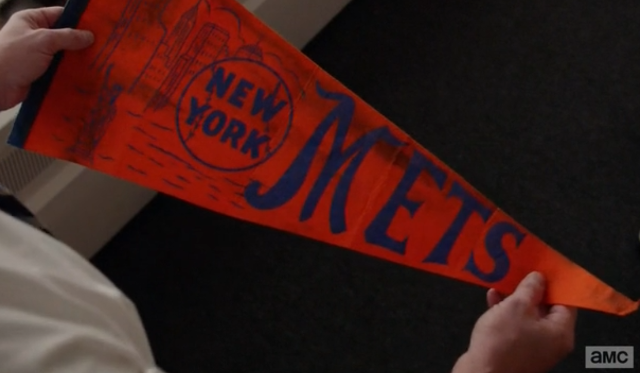Don: I worry about a lot of things, but I don't worry about you.
Peggy: What do you have to worry about?
Don: That I've never done anything. And that I don't have anyone.
There you go. That's the show I remember. So I want it all, now. And I'll have to wait another year.
Season seven in both parts will probably run the span of 1969. We're somewhere in June, I think. Late June, maybe because someone is grateful at one point for the air conditioning in a hotel. Don talks about seeing his wife again in LA at the end of July, which he would have called "the end of month" if it had been July. There's also no discussion of an impending moon launch.
Baseball should be important to everybody sooner or later. For one thing, after finding the late Lane Pryce's old Mets pennant crumpled beneath the radiator in his new, smaller office, Don, in a drunken haze, invites the sober Freddy Rumsen out for a trip to Shea with him. In June 1969, the Mets are not yet the wunderkind of baseball. But if it's June, the Mets are beginning one of the most exciting climbs to the top that an organized ball club has ever known. They began the month with a nine game winning streak and finished it 19-9, still behind Chicago, but not for long. Maybe it's appropriate that Don - newly demoted to work for Peggy - identify with Lane's adopted baseball team, for the 1969 Mets were the "Miracle," which is what it will take to save Don in every respect before the end of the show.
It's also important because no matter what month of 1969 it is on Mad Men right now, the New York Jets are the champions of professional football in the United States. Sporting events get very little airplay on the show, which is why the Mets pennant (though definitely not official-looking) is so vital. Granted, Harry Crane came up with "Broadway Joe on Broadway," the TV special that gave Dow Chemical some commercial air time to make Americans think of something other than its napalm product being dropped on jungles in Vietnam, but Super Bowl III was simply mentioned on the show as "the Super Bowl," and not as a triumph for the home town football team. I was disappointed. How could I not be? Is Matt Weiner a Giants fan?
***
If two names could fit into the world of Madison Avenue 1969, it would be Sid Abramowitz and Harry Boatswain, both of whom wore #69 for the New York Jets. The number has two wearers who lasted a while in uniform, and four who were with us for barely a single year. Sid and Harry would be two of the latter. Abramowitz was drafted in the fifth round out of Air Force by the Baltimore Colts in 1983, and then later played for the Jets in 1985, a good season as Jets seasons go.
Harry Boatswain was born in Brooklyn, on June 26, 1969, maybe even during the very evening that Don and Peggy have that conversation above. He passed away in 2005. The single season he spent with us was 1996, the very worst season of the franchise's existence. Jere Longman quoted Boatswain at the end of an article in the Times about Jets players giving away presents at a community center at Christmas time, near the end of their 1-15 season. Longman suggests that it is a brief reprieve from a genuinely demoralizing season, but that even as they hand out footballs to kids, the players see looks of sympathy and pity for them. Why continue? wonders tight end Kyle Brady. Longman writes:
The players continue because they are professionals, and they are paid exorbitantly to play a game they have played since childhood. The season is lost, but there are smaller battles to win. A personal confrontation with an opponent. A contract for next season. Sometimes the rewards are simple gestures that were routine, even ignored, in the past.
''I got a letter from some kid in Africa who said I'm his inspiration,'' said offensive tackle Harry Boatswain. ''I don't know if it's true or not. Probably, my brother sent it to me to make me feel better.''
How Harry Boatswain became an inspiration to a child in Africa is indeed a mystery. He probably had reason to be suspicious, and he probably did have a good brother. Where that child from Africa, if he did exist, came from, and where he was going, leaves me with a sense of life's dislocations in time and in place. Seasons are lost, battles are waged, gestures that we make to one another as a means for making sense of it all come and go. There is always another year, apparently.
But life was too short for Harry Boatswain. His premature death came from a fatal heart attack apparently, while residing in Las Vegas. At the Stern Fan Network in 2005, three participants mention Boatswain's obituary in the Daily News. One says that "he lived out his Jet dream," possibly even speaking verbatim from the obit. Boatswain was a Brooklyn boy who, like me, was born in the year of his favorite team's only championship - only then to play for them in their worst year. Only the Jets could do that to a loyal fan. Only us.

1 comment:
Gone too Soon
Post a Comment